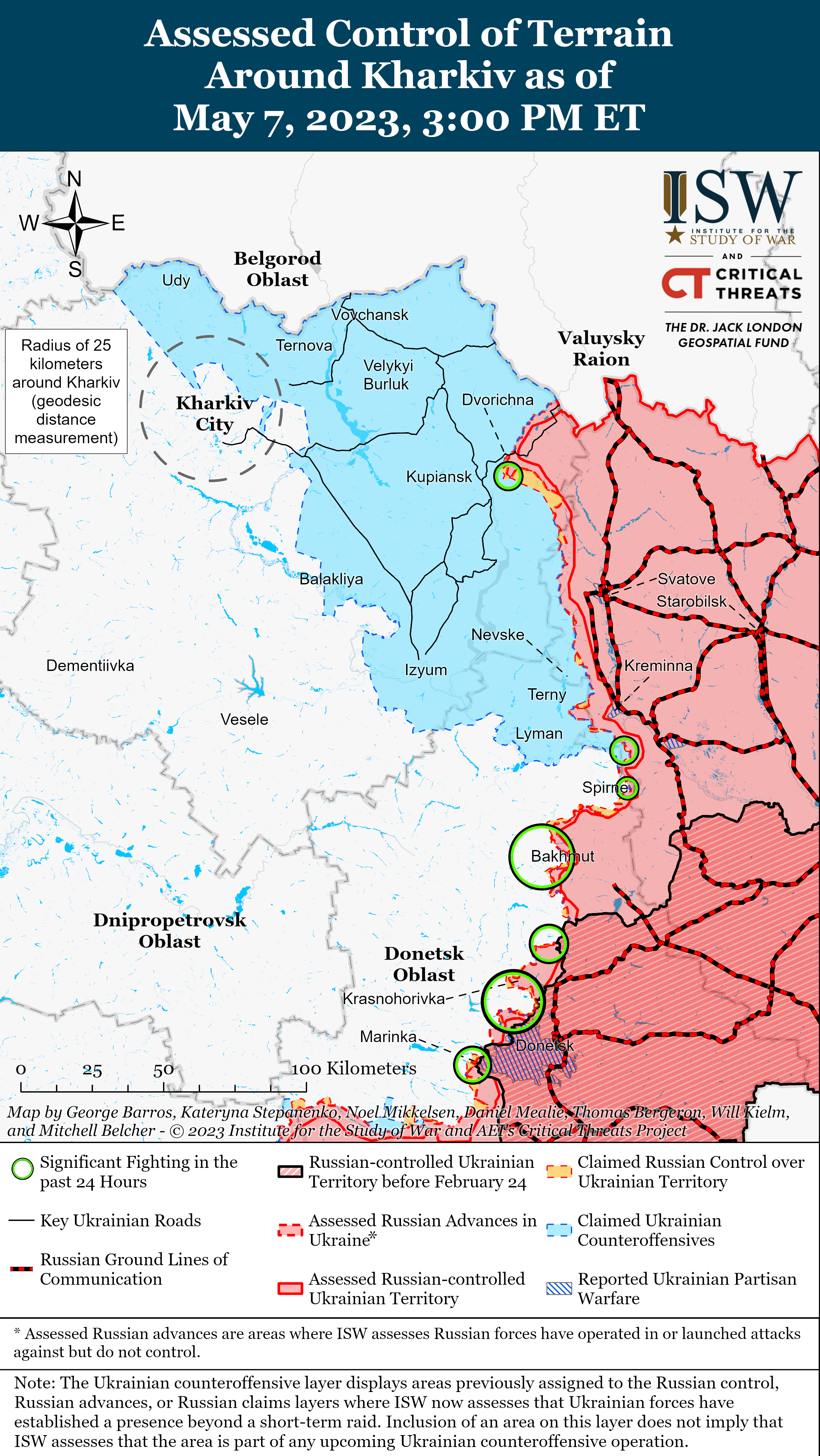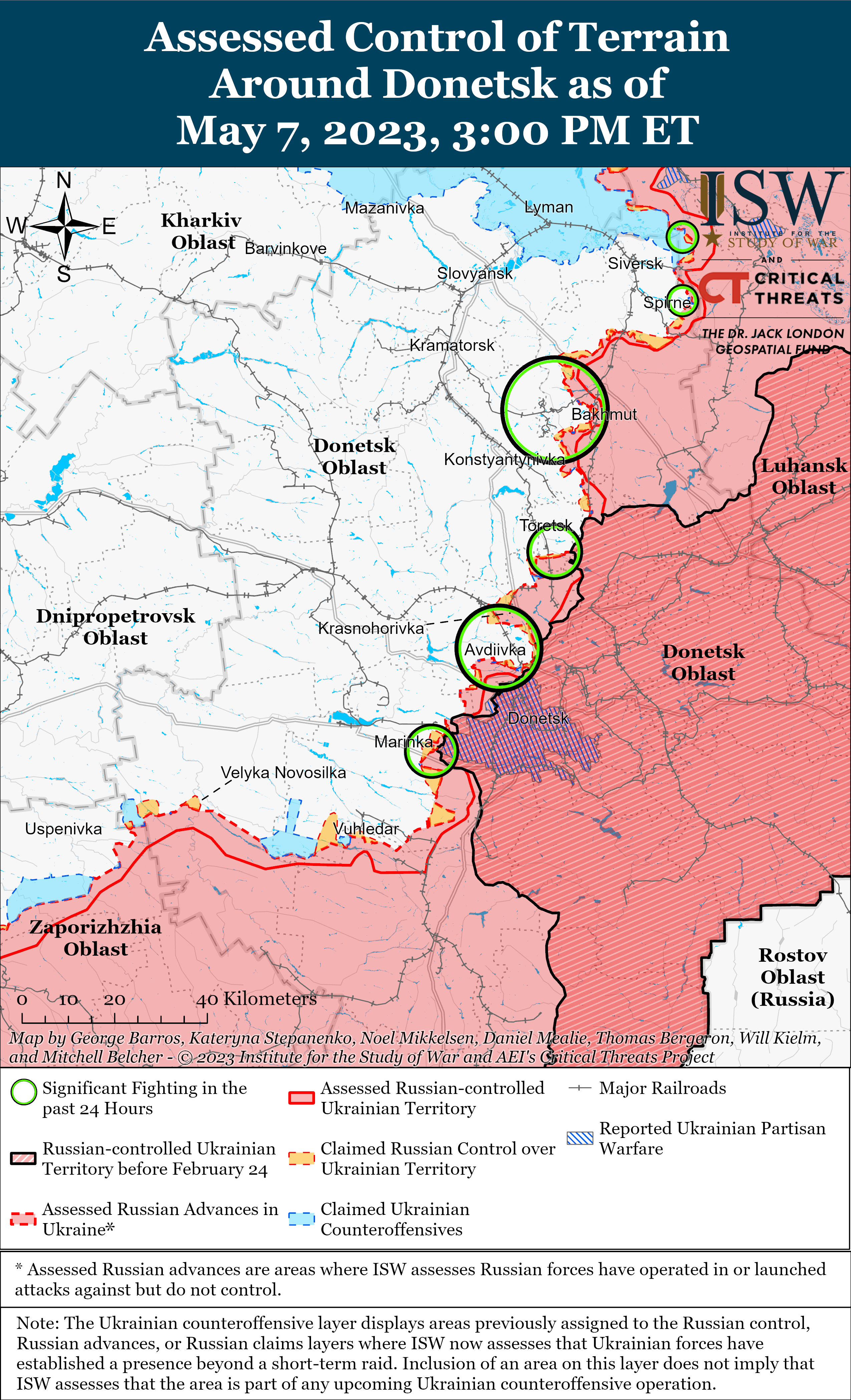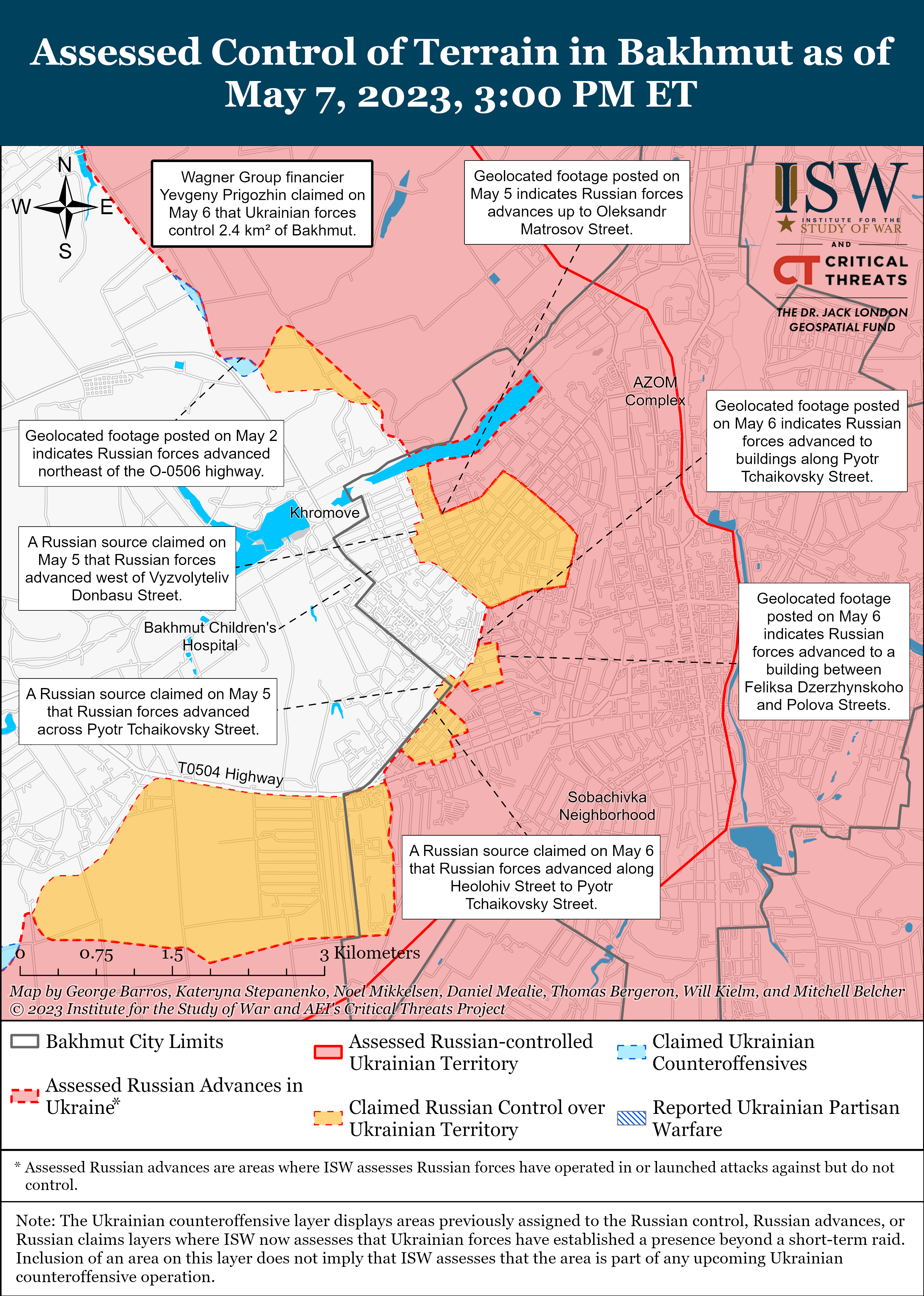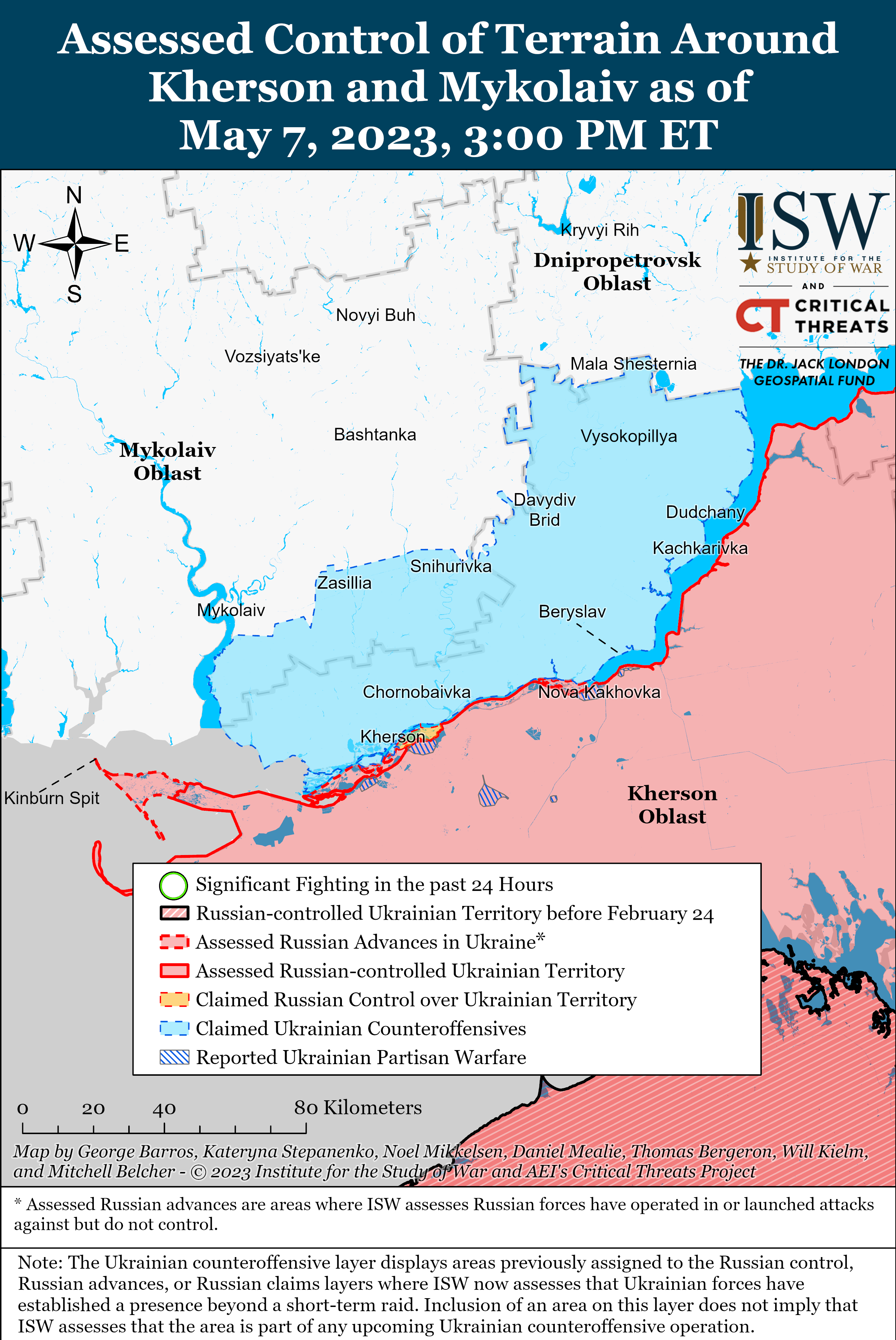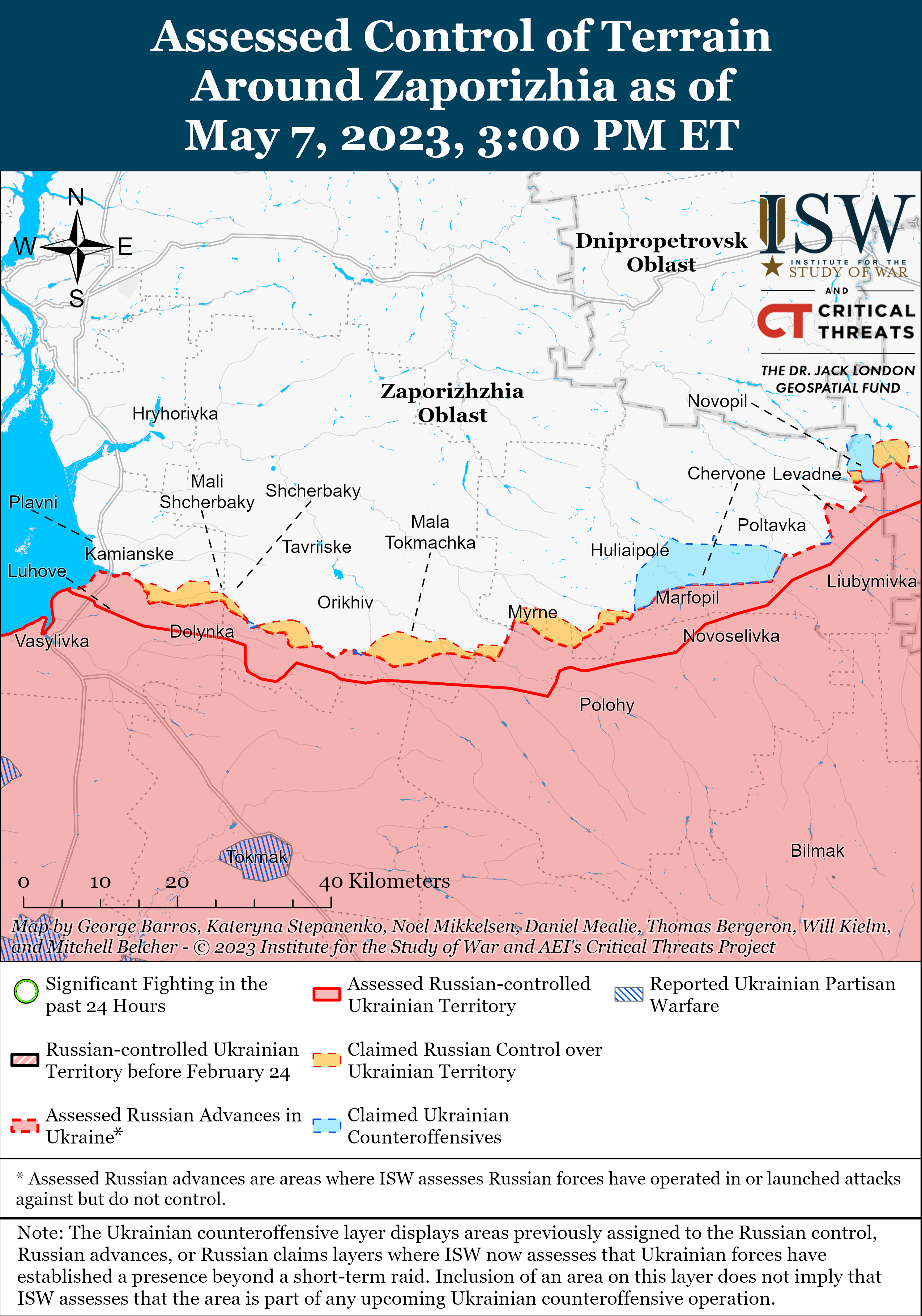Kateryna Stepanenko, Grace Mappes, Riley Bailey, Layne Philipson,
Click here to see ISW’s interactive map of the Russian invasion of Ukraine. This map is updated daily alongside the static maps present in this report.
Click here to access ISW’s archive of interactive time-lapse maps of the Russian invasion of Ukraine. These maps complement the static control-of-terrain map that ISW produces daily by showing a dynamic frontline. ISW will update this time-lapse map archive monthly.
Wagner Group financier Yevgeny Prigozhin and Chechen leader Ramzan Kadyrov may have compelled the Russian theater commander in Ukraine, Army General Valery Gerasimov, to resume artillery ammunition distribution to the Wagner forces in Bakhmut despite Gerasimov’s desired de-prioritization of that effort. Prigozhin announced on May 7 that he had obtained a document from the Russian Ministry of Defense (MoD) that promised to supply Wagner forces with the ammunition and weapons necessary to maintain offensive operations in Bakhmut.[1] Prigozhin has not published the official document and ISW cannot verify Prigozhin’s claims at this time. The Russian MoD likely has not fundamentally changed its intention of deprioritizing offensive operations and conserving munitions across the theater, as ISW has recently assessed. Prigozhin and Kadyrov likely effectively blackmailed the Russian MoD into allocating resources to Wagner forces in Bakhmut by threatening to pull Kadyrov’s Chechen forces from other parts of the theater to relieve Wagner forces in Bakhmut.[2] Prigozhin also claimed that the MoD gave Wagner complete freedom of operations in Bakhmut and appointed Army General Sergey Surovikin as an intermediary between the MoD and Wagner, actions that would indicate that Gerasimov and possibly Minister of Defense Sergei Shoigu lack the ability to command Prigozhin and Kadyrov as subordinates but must instead negotiate with them as peers.[3] This assessment assumes that Prigozhin’s claims that the MoD was withholding shells but has now agreed to supply them are true—the MoD has made no official statements regarding those claims—and Ukrainian officials report that they have not observed a decline in Wagner shelling during this period (see below).[4]
Kadyrov’s threats to transfer his forces to Bakhmut may have blackmailed the Russian military command into allocating ammunition to Wagner mercenaries. Kadyrov published a letter on May 6 asking Russian President Vladimir Putin to order Russian Defense Minister Sergei Shoigu and Director of the Russian National Guard (Rosgvadia) Viktor Zolotov to authorize the transfer of Chechen “Akhmat” units from “other directions” to assume Wagner’s positions in the Bakhmut direction.[5] Kadyrov’s letter to Putin bypassed the Russian chain of command, and the withdrawal of Chechen forces from other parts of the theater likely posed a risk to Russian defensive lines, a risk that Gerasimov and Shoigu, or Putin, appear to have been unwilling to take. ISW previously observed Akhmat units operating in the Bilohorivka area on the Svatove-Kreminna line and in Zaporizhia Oblast, and their withdrawal from those positions might undermine Russia’s defensive preparations ahead of the planned Ukrainian counteroffensives.[6] Shoigu and Gerasimov, who have been consistently loyal to Putin’s orders, may alternatively have decided to allocate ammunition to Wagner at Putin’s direction. Kadyrov’s and Prigozhin’s apparently successful joint blackmail efforts further indicate that Gerasimov does not actually control all the Russian forces in Ukraine, despite being the nominal theater commander. Gerasimov likely attempted to assume control over all Russian irregular forces over the winter of 2023 but had failed in that endeavor even before losing favor with Putin in the spring.[7]
Kadyrov likely supported Wagner’s blackmail efforts against the Russian military command in order to reestablish his position within the circle of power in the Kremlin. Kadyrov had previously held an influential position within the Putin's close circle in until apparently losing favor recently, likely because his forces played a limited role in active combat operations in Ukraine throughout late fall of 2022 and winter of 2023.[8] Putin belittled Kadyrov during their meeting on March 13 where Kadyrov appeared visibly nervous when reporting on the Chechen fighters’ role in Ukraine.[9] Kadyrov likely saw Prigozhin’s threats to withdraw from Bakhmut as an opportunity to play up the effectiveness of his forces against the backdrop of Gerasimov‘s and Shoigu’s failures to deliver decisive victories during the winter-spring offensive.
Gerasimov's apparent need to negotiate with subordinate commanders and those commanders’ ability to force his hand suggests that chain of command problems are significantly impacting the Russian military’s ability to conduct coherent theater-wide operations. The position of overall theater commander should in principle allow Gerasimov to command any Russian unit or ground forces commander in Ukraine, even those in charge of irregular formations such as Wagner and Akhmat. Prigozhin and Kadyrov appear to be able to largely make independent decisions concerning their forces, however, a phenomenon that appears to have become more pronounced the longer these forces have had de facto control over certain sectors of the frontline. Wagner and the Russian MoD appeared to have recently reached an agreement about the delineation of responsibilities between conventional and irregular forces. The Russian military command deployed Russian Airborne Forces (VDV) to defend the flanks around Bakhmut around when Wagner began advancing in the city itself, for example.[10] ISW previously assessed that the Russian military command had likely recently decided to reprioritize efforts and resource allocation to prepare to receive potential Ukrainian counteroffensive operations but did not set conditions to appease Prigozhin or offset Wagner’s likely degradation in the Bakhmut area.[11] The subsequent upheaval over the de-prioritization of Bakhmut and the Russian military command's reversal on supplying Wagner is likely to undermine this theater-wide effort.
These events raise questions about Russia’s ability to coordinate a coherent theater-wide defensive campaign. The Russian military command appears to be increasingly delegating responsibilities for different sectors of the front in Ukraine to various Russian commanders while the power of the theater commander continues to wane.[12] Gerasimov’s degraded abilities to control his commanders will likely further limit the Russian military’s ability to conduct coherent operations involving different areas of responsibility. ISW has previously assessed that factional dynamics within the Russian military are shaping decision making to an unusual degree, and the increasing erosion of the Russian chain of command is likely caught in a self-reinforcing feedback loop with the Russian military’s growing factionalism.[13] ISW assesses that Putin is unlikely to remove Gerasimov as overall theater commander for reputational reasons, and therefore Prigozhin’s and Kadyrov’s public undermining of Gerasimov may have lasting impacts on the power of the overall theater commander’s position.[14] Putin may seek to reward commanders he favors with responsibility beyond their official positions instead of outright appointing them to a higher position.[15] The Russian military is highly unlikely to solve these chain of command issues in the near term, and these problems will likely influence how Russian forces on different axes respond to potential Ukrainian counteroffensive operations.
Prigozhin’s and Kadyrov’s ability to significantly influence the Russian military command decisions relies on Putin’s willingness to appease them and his reliance on their forces, both of which will likely degrade after further blackmail efforts. Both Prigozhin and Kadyrov retain likely differing amounts of favor and personal contact with Putin despite their individual tensions with the Russian military command.[16] The decision to blackmail and subsequently humiliate the Russian military command may have expended a fair amount of Prigozhin‘s and Kadyrov’s political capital to influence operational and strategic level military decision-making. Such high-profile blackmailing is likely not a feasible long-term strategy for Prigozhin and Kadyrov given their reliance on Putin’s favor to bend the MoD to their demands. Prigozhin has already lost favor with Putin in recent months, with recent events appearing to demonstrate that he needed Kadyrov’s own capital to successfully blackmail the Russian military command into additional ammunition provision. Putin notably avoids firing members of his inner circle, however, instead rotating them into and out of favor, influence, and resources.[17] Prigozhin and Kadyrov are unlikely to generate such extreme effects again without damaging their relationships with Putin.
Prigozhin’s continued fight to complete the capture of Bakhmut contradicts his consistent narrative that capturing Bakhmut lacks strategic value. Prigozhin released a 41-point letter on May 6 (prior to his announcement about the provision of additional ammunition) criticizing the Russian MoD for intentionally refusing to support Wagner in Bakhmut.[18] Prigozhin claimed that he and Surovikin organized “Operation Bakhmut Meatgrinder” in October 2022 to provoke Kyiv into throwing Ukrainian forces into Bakhmut en masse.[19] Prigozhin reiterated that Wagner’s main task in Bakhmut has always been to exhaust Ukrainian forces in a meat-grinder, and not to capture the settlement.[20] Prigozhin claimed that completing the capture of Bakhmut is not operationally significant, rejecting Shoigu’s March 7 claim that taking Bakhmut would open the way for further Russian offensive efforts in Donbas, a narrative that Prigozhin has consistently maintained since November 2022.[21] Prigozhin’s long-standing claims that Bakhmut is not of strategic importance contradict his demands that the Russian MoD provide Wagner the necessary ammunition to allow it to complete the capture of Bakhmut, suggesting that Prigozhin continues to prioritize his own personal aims over those of the Russian military command and good of the overall Russian war effort.[22]
Key Takeaways
- Wagner Group financier Yevgeny Prigozhin and Chechen leader Ramzan Kadyrov may have compelled the Russian theater commander in Ukraine, Army General Valery Gerasimov, to resume artillery ammunition distribution to Wagner forces in Bakhmut despite Gerasimov’s desired de-prioritization of that effort.
- Kadyrov’s threats to transfer his forces to Bakhmut may have blackmailed the Russian military command into allocating ammunition to Wagner mercenaries.
- Kadyrov likely supported Wagner’s blackmail efforts against the Russian military command to reestablish his position within the circle of power of the Kremlin.
- Gerasimov's apparent need to negotiate with subordinate commanders and those commanders’ ability to force his hand suggests that chain of command problems are significantly impacting the Russian military's ability to conduct coherent theater-wide operations.
- These events raise questions about Russia’s ability to coordinate a coherent theater-wide defensive campaign.
- Prigozhin’s and Kadyrov’s ability to significantly influence Russian military command decisions relies on Putin’s willingness to appease them and his reliance on their forces – both of which will likely degrade after further blackmail efforts.
- Prigozhin’s continued fight to complete the capture of Bakhmut contradicts his consistent narrative that capturing Bakhmut lacks strategic value.
- Russian forces continued limited offensive operations northeast of Kupyansk and south of Kreminna.
- Russian forces made some territorial gains in Bakhmut as of May 7 and continued limited offensive operations on the Avdiivka-Donetsk front.
- Russian sources claimed that Ukrainian forces launched up to 23 drones at Crimea on the night of May 6 to 7.
- Russian federal subjects are continuing to recruit and form regional armed formations and volunteer battalions.
- Russian occupation authorities continue to plan and carry out forced evacuations from Zaporizhia Oblast.
We do not report in detail on Russian war crimes because these activities are well-covered in Western media and do not directly affect the military operations we are assessing and forecasting. We will continue to evaluate and report on the effects of these criminal activities on the Ukrainian military and the Ukrainian population and specifically on combat in Ukrainian urban areas. We utterly condemn these Russian violations of the laws of armed conflict, Geneva Conventions, and humanity even though we do not describe them in these reports.
- Russian Main Effort – Eastern Ukraine (comprised of two subordinate main efforts)
- Russian Subordinate Main Effort #1 – Capture the remainder of Luhansk Oblast and push westward into eastern Kharkiv Oblast and encircle northern Donetsk Oblast
- Russian Subordinate Main Effort #2 – Capture the entirety of Donetsk Oblast
- Russian Supporting Effort – Southern Axis
- Russian Mobilization and Force Generation Efforts
- Activities in Russian-occupied areas
Russian Main Effort – Eastern Ukraine
Russian Subordinate Main Effort #1 – Luhansk Oblast (Russian objective: Capture the remainder of Luhansk Oblast and push westward into eastern Kharkiv Oblast and northern Donetsk Oblast)
Russian forces continued limited offensive operations northeast of Kupyansk and south of Kreminna on May 7. The Ukrainian General Staff reported that Russian forces conducted unsuccessful offensive operations near Synkivka, Kharkiv Oblast (8km northeast of Kupyansk); Bilohorivka, Luhansk Oblast (12km south of Kreminna); and Spirne, Donetsk Oblast (25km south of Kreminna).[23] The Russian Ministry of Defense (MoD) claimed that Russian forces suppressed four Ukrainian sabotage and reconnaissance groups near Kyslivka (22km southeast of Kupyansk) and Synkivka in Kharkiv Oblast and Novoselivske, Luhansk Oblast (14km northwest of Svatove).[24]
Russian Subordinate Main Effort #2 – Donetsk Oblast (Russian Objective: Capture the entirety of Donetsk Oblast, the claimed territory of Russia’s proxies in Donbas)
Russian forces made some territorial gains in Bakhmut as of May 7. Geolocated footage indicates that Wagner Group forces advanced further west in Bakhmut and near Sakko i Vanzetti (15km north of Bakhmut).[25] The Russian Ministry of Defense (MoD) claimed that the Wagner Group forces captured two blocks in northern and western Bakhmut.[26] A Russian milblogger claimed that the Wagner Group forces made marginal advances in northern Bakhmut and continued attacking Ukrainian positions in western and southern Bakhmut.[27] The Ukrainian General Staff reported that Russian forces continued attacking in Bakhmut, and Russian forces conducted unsuccessful ground attacks near Bohdanivka (6km northwest of Bakhmut), Khromove (immediately west of Bakhmut), Ivanivske (6km west of Bakhmut), Chasiv Yar (12km west of Bakhmut), Stupochky (12km southwest of Bakhmut), Predtechyne (14km southwest of Bakhmut), and Niu York (30km southwest of Bakhmut).[28] A Wagner-affiliated milblogger claimed that Wagner artillery has increased its rate of fire in the Bakhmut area following the May 7 artillery ammunition delivery from the Russian MoD.[29] Ukrainian Eastern Group of Forces Spokesperson Colonel Serhiy Cherevaty stated on May 7 that Wagner units – not Chechen units – are continuing to attack in Bakhmut and noted that Russian artillery fire did not decrease in the city despite claims of “shell hunger” in the area.[30] Ukrainian Eastern Group of Forces Commander Colonel General Oleksandr Syrskyi stated on May 7 that Russian forces increased the rate of shelling in the Bakhmut area and that Russian forces still hope to capture the city by the May 9th (Russian Victory Day).[31]
Russian forces conducted limited ground attacks on the Avdiivka-Donetsk City line on May 7. The Ukrainian General Staff reported that Russian forces conducted unsuccessful ground attacks near Avdiivka, Pervomaiske (11km southwest of Avdiivka), and Marinka (27km southwest of Avdiivka).[32] A Russian milblogger claimed that Russian forces failed to advance on the southern approaches to Avdiivka and in Marinka, and that Russian forces increased the rate of artillery fire along the Avdiivka-Donetsk City frontline.[33]
Russian forces did not conduct any confirmed or claimed ground attacks in western Donetsk Oblast on May 7.[34] The Russian MoD claimed that Russian forces repelled a Ukrainian reconnaissance in force operation near Velyka Novosilka, Donetsk Oblast (32km northwest of Vuhledar) and a sabotage and reconnaissance group near Levadne, Zaporizhia Oblast (23km northeast of Hulyaipole).[35]
Russian Supporting Effort – Southern Axis (Russian objective: Maintain frontline positions and secure rear areas against Ukrainian strikes)
The Russian Ministry of Defense (MoD) acknowledged that Ukrainian forces maintain a presence on islands in the Dnipro River delta as of May 7. The Russian MoD claimed on May 7 that Russian forces struck a Ukrainian command center on Velykyi Island (23km southwest of Kherson City).[36]
Russian forces continued routine fire west of Hulyaipole and in Dnipropetrovsk, Kherson, and Mykolaiv oblasts on May 7.[37] Ukraine’s Southern Operational Command reported that Russian forces launched five Kh-22 missiles against Mykolaiv Oblast and one against Kherson Oblast.[38] Ukraine’s Southern Operational Command also reported that Russian forces struck Kherson City, likely with two Oniks coastal defense missiles.[39]
Ukrainian forces continued to target Russian logistics on the east (left) bank of Kherson Oblast on May 7. Ukraine’s Southern Operational Command reported that Ukrainian aviation units struck two Russian manpower and equipment concentrations in Kakhovka and Skadovsk raions.[40]
Russian sources claimed that Ukrainian forces launched up to 23 drones at Crimea on the night of May 6 to 7. The Russian MoD claimed that Russian air defenses destroyed 22 Ukrainian drones over the Black Sea, and Sevastopol Occupation Governor Mikhail Razvozhaev claimed that Ukrainian forces launched at least 10 drones towards Crimea and Sevastopol.[41] A prominent Russian milblogger claimed that Ukrainian forces launched 22 Mugin-5 drones and a Tu-141 Strizh drone and that Russian air defense units of the 31st Air Defense Division of the Black Sea Fleet alongside unspecified electronic warfare units downed all the drones near Sevastopol and Hvardiyske (19km north of Simferopol).[42] The MoD’s acknowledgement of the claimed Ukrainian drone attack is a departure from its regular claims and may be a part of a larger Russian informational effort not to downplay Ukrainian capabilities ahead of a potential Ukrainian counteroffensive.[43]
Russian Mobilization and Force Generation Efforts (Russian objective: Expand combat power without conducting general mobilization)
Russian federal subjects are continuing to recruit and form regional armed formations and volunteer battalions. A Tula Oblast news outlet reported that Tula Oblast is proposing to create a separate volunteer battalion to unite Tula volunteers that are scattered along different battalions and frontlines.[44] The outlet noted reports that Tula Oblast Governor Alexey Dyumin is supporting the creation of this volunteer battalion. Head of the Republic of Bashkortostan Alik Kamaletdinov claimed that the region is recruiting volunteers for a regional motorized rifle regiment that will encompass existing Dayan Murzin and Severnye Amury volunteer battalions.[45] Kamaletdinov announced that Bashkortostan opened 72 mobile recruitment points and relaxed the health and age standard for recruits and claimed that more men are interested in volunteering since the Russian MoD improved the conditions for volunteer service. Kamaletdinov clarified that Bashkortostan’s Shaymuratov and Dostavalov volunteer battalions operate as part of their own military formations, while the Slavat Yulaev volunteer battalion belongs to the Russian national guard (Rosgvardia).
Select Russian parliamentarians are enlisting to serve in the war likely in an attempt to promote contract service in Russia. The Kremlin-affiliated outlet Kommersant reported that two members of the Russian Communist Party from Kazan and Almetyevsk joined a volunteer battalion and are undergoing training in Tambov Oblast.[46] Both officials signed a six-month contract with the Russian MoD.
The UK MoD assessed that Russia is facing the worst labor shortages in decades based on the Russian Central Bank’s survey.[47] The bank surveyed 14,000 employers and found that the number of available employees is at the lowest level since 1998. The UK MoD assessed that the Covid-19 pandemic, high emigration rates, and the war in Ukraine had decreased Russian population by two million more people than expected.
Activities in Russian-occupied areas (Russian objective: Consolidate administrative control of annexed areas; forcibly integrate Ukrainian civilians into Russian sociocultural, economic, military, and governance systems)
Russian occupation authorities continue to plan and carry out forced evacuations from Zaporizhia Oblast. Zaporizhia Oblast occupation head Yevgeny Balitsky claimed on May 7 that 1,552 people (including 632 children, 145 patients from neuropsychiatric centers, and 10 people with limited mobility) have relocated from areas included in evacuation orders.[48] Zaporizhia Oblast occupation official Vladimir Rogov claimed on May 6 that evacuations from frontline settlements are taking place on a purely voluntary basis and that there is no forced evacuation.[49] Rogov stated that Russian occupation authorities continue to adjust and expand settlements included in the partial evacuation order, emphasizing that peaceful localities along the frontline are not included in the lists.[50]
Russian forces and occupation authorities are setting conditions to make life unbearable in occupied Zaporizhia Oblast to accelerate forceful evacuations. Ukrainian Zaporizhia Oblast officials stated on May 6-7 that Russian forces and occupation authorities are intentionally sparking panic in occupied Tokmak and Enerhodar by withholding humanitarian supplies and raising the prices of food and other goods in stores. Ukrainian Zaporizhia Oblast officials also stated that the Russian occupation authorities are removing medical equipment from hospitals and discharging patients early, offering them continued medical care if they evacuate to territory deeper in the Russian rear.[51]
Significant activity in Belarus (ISW assesses that a Russian or Belarusian attack into northern Ukraine in early 2023 is extraordinarily unlikely and has thus restructured this section of the update. It will no longer include counter-indicators for such an offensive.)
ISW will continue to report daily observed Russian and Belarusian military activity in Belarus, but these are not indicators that Russian and Belarusian forces are preparing for an imminent attack on Ukraine from Belarus. ISW will revise this text and its assessment if it observes any unambiguous indicators that Russia or Belarus is preparing to attack northern Ukraine.
Nothing significant to report.
Note: ISW does not receive any classified material from any source, uses only publicly available information, and draws extensively on Russian, Ukrainian, and Western reporting and social media as well as commercially available satellite imagery and other geospatial data as the basis for these reports. References to all sources used are provided in the endnotes of each update.
[4] https://www.reuters.com/world/europe/russia-steps-up-fight-bakhmut-hopes-capture-it-soon-says-ukraine-general-2023-05-07/
[6] https://www.understandingwar.org/backgrounder/russian-offensive-campaign-assessment-april-23-2023
[7] https://understandingwar.org/backgrounder/russian-offensive-campaign-assessment-april-30-2023#_edn56
[8] https://www.understandingwar.org/sites/default/files/Russian%20Offensive%20Campaign%20Assessment%2C%20March%2013%2C%202023.pdf; https://www.understandingwar.org/backgrounder/russian-offensive-campaign-assessment-october-25 ; https://www.understandingwar.org/backgrounder/russian-offensive-campaign-assessment-april-30-2023
[9] https://www.understandingwar.org/sites/default/files/Russian%20Offensive%20Campaign%20Assessment%2C%20March%2013%2C%202023.pdf
[11] https://www.understandingwar.org/backgrounder/russian-offensive-campaign-assessment-may-6-2023 ; https://www.understandingwar.org/backgrounder/china-taiwan-weekly-update-may-5-2023
[12] https://www.understandingwar.org/backgrounder/russian-offensive-campaign-assessment-april-30-2023
[13] https://www.understandingwar.org/backgrounder/russian-offensive-campaign-assessment-april-30-2023
[14] https://www.understandingwar.org/backgrounder/russian-offensive-campaign-assessment-april-30-2023
[15] https://www.understandingwar.org/backgrounder/russian-offensive-campaign-assessment-april-30-2023
[16] https://t.me/RKadyrov_95/3604; https://t.me/boris_rozhin/84962; https://www.washingtonpost.com/world/2023/05/05/wagner-russia-ukraine-di...
[18] https://telegra.ph/Otvety-Evgeniya-Prigozhina-na-glavnye-voprosy-kotorye-est-u-obshchestva-05-06
[19] https://telegra.ph/Otvety-Evgeniya-Prigozhina-na-glavnye-voprosy-kotorye-est-u-obshchestva-05-06
[20] https://telegra.ph/Otvety-Evgeniya-Prigozhina-na-glavnye-voprosy-kotorye-est-u-obshchestva-05-06
[21] https://telegra.ph/Otvety-Evgeniya-Prigozhina-na-glavnye-voprosy-kotorye-est-u-obshchestva-05-06; https://tass dot ru/armiya-i-opk/17211867; https://www.understandingwar.org/backgrounder/russian-offensive-campaign-assessment-november-25; https://www.understandingwar.org/backgrounder/russian-offensive-campaign-assessment-april-24-2023; https://www.understandingwar.org/sites/default/files/APR%2029%20Russian%...
[22] https://t.me/Prigozhin_hat/2108; https://t.me/Prigozhin_hat/2342; https://t.me/Prigozhin_hat/2476; https://t.me/Prigozhin_hat/3173
[23] https://www.facebook.com/GeneralStaff.ua/posts/pfbid0DzhMiMJs6HUnhiPFZW4i1aVCn8T6i1SVm3Fn7n1PPvrHPp7W4nngmyeG2BajpHstl ; https://www.facebook.com/GeneralStaff.ua/posts/pfbid0Epe4mKdvePrp1awKF4CYnYN6VAkq25ePTfLgcykeqUcwsXqPDp351yAiPb6unYCBl
[25] 0https://twitter.com/Danspiun/status/1654949178974273538?t=b_Dmc6dNVIxNDimIRgp9yg&s=19; https://twitter.com/JagdBandera/status/1654887231495061506; https://t.me/WarArchive_ua/1011
[28] https://www.facebook.com/GeneralStaff.ua/posts/pfbid0DzhMiMJs6HUnhiPFZW4i1aVCn8T6i1SVm3Fn7n1PPvrHPp7W4nngmyeG2BajpHstl; https://www.facebook.com/GeneralStaff.ua/posts/pfbid0Epe4mKdvePrp1awKF4C...
[30] https://armyinform dot com.ua/2023/05/07/zagoniv-kadyrivcziv-my-ne-sposterigayemo-v-bahmuti-sergij-cherevatyj/
[32] https://www.facebook.com/GeneralStaff.ua/posts/pfbid0Epe4mKdvePrp1awKF4CYnYN6VAkq25ePTfLgcykeqUcwsXqPDp351yAiPb6unYCBl; https://www.facebook.com/GeneralStaff.ua/posts/pfbid0DzhMiMJs6HUnhiPFZW4...
[34] https://www.facebook.com/GeneralStaff.ua/posts/pfbid0Epe4mKdvePrp1awKF4C... https://www.facebook.com/GeneralStaff.ua/posts/pfbid0DzhMiMJs6HUnhiPFZW4...
[37] https://www.facebook.com/GeneralStaff.ua/posts/pfbid0DzhMiMJs6HUnhiPFZW4i1aVCn8T6i1SVm3Fn7n1PPvrHPp7W4nngmyeG2BajpHstl ; https://www.facebook.com/GeneralStaff.ua/posts/pfbid0Epe4mKdvePrp1awKF4CYnYN6VAkq25ePTfLgcykeqUcwsXqPDp351yAiPb6unYCBl ; https://www.facebook.com/OperationalCommandSouth/posts/pfbid02BHyjvJN7SzRSiBz6NbVGRoRkdruzjfnxeoCXnBkXg3ENpoj8PQvHUo1DkXtKaxG2l
[38] https://www.facebook.com/OperationalCommandSouth/posts/pfbid02BHyjvJN7SzRSiBz6NbVGRoRkdruzjfnxeoCXnBkXg3ENpoj8PQvHUo1DkXtKaxG2l
[39] https://www.facebook.com/OperationalCommandSouth/posts/pfbid02BHyjvJN7SzRSiBz6NbVGRoRkdruzjfnxeoCXnBkXg3ENpoj8PQvHUo1DkXtKaxG2l
[40] https://www.facebook.com/OperationalCommandSouth/posts/pfbid02BHyjvJN7SzRSiBz6NbVGRoRkdruzjfnxeoCXnBkXg3ENpoj8PQvHUo1DkXtKaxG2l
[44] https://tulapressa dot ru/2023/05/xotim-zashhishhat-svoj-gorod-v-tule-predlagayut-sozdat-otdelnyj-batalon-dobrovolcev-4612/
[45] https://sobkor02 dot ru/news/svo/38508/
[46] https://www.kommersant dot ru/doc/5976927


